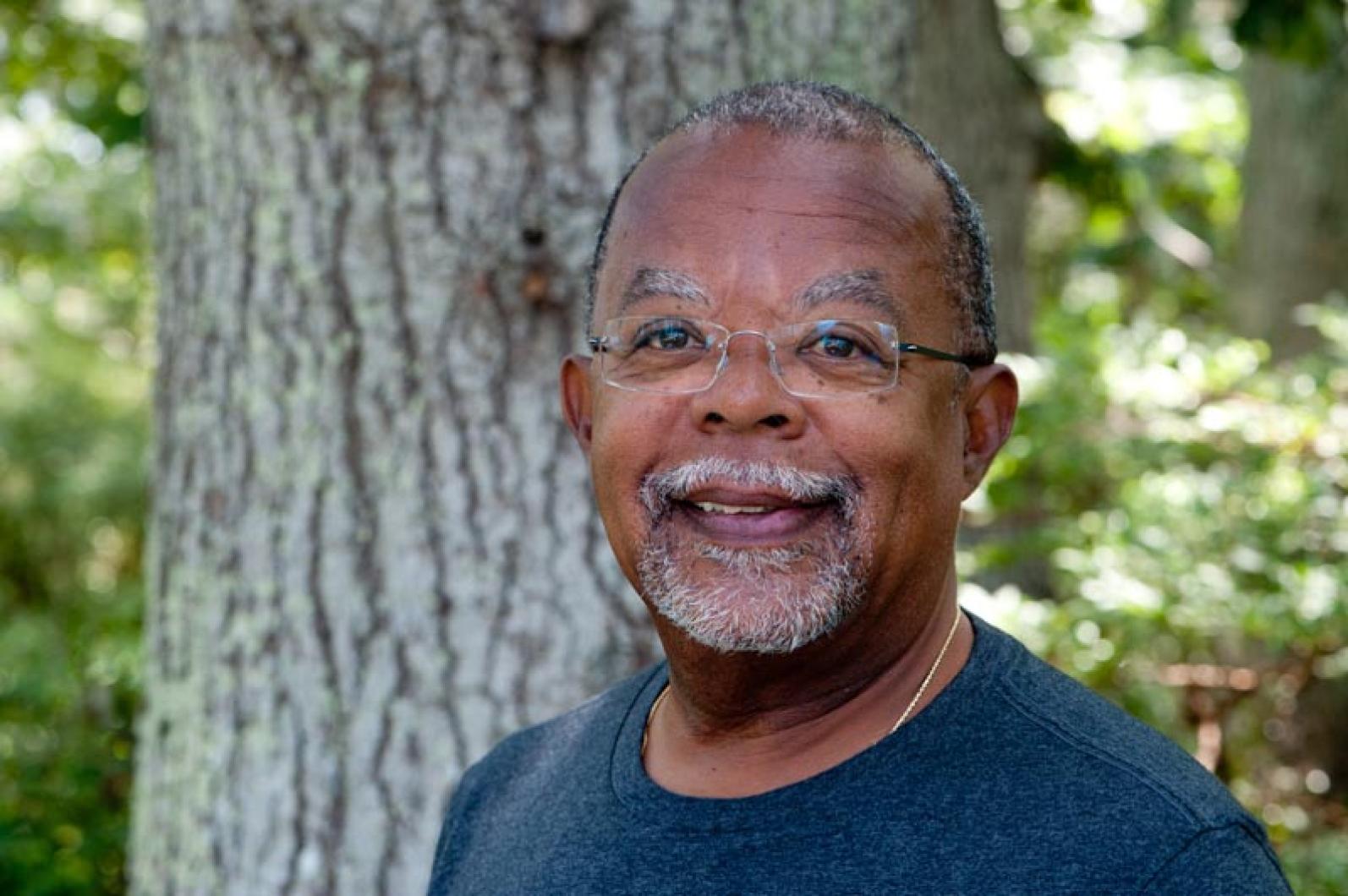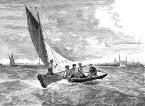Henry Louis (Skip) Gates Jr. is passionate about roots. The Harvard professor, writer and genealogist first started on a family tree as a nine-year-old, after his grandfather’s burial, wanting to know about his connection to his father and grandfather. He’s followed his passion in his professional life, through scholarship and his popular television shows tracing people’s genealogy, and in the personal realm: still working on the family tree, he is trying to find the identity of his great-great-grandfather.
Some of that work has been done, for the last 32 years, on the Vineyard, a place where he finds a link to the past.
“It was the first beach resort where African Americans could own property in the Northeast,” he said. “So it has a long tradition of black intellectuals and professionals congregating here in the summer. It has a long tradition that we’re all heir to and part of. So there’s a great deal of gravitas here. You feel that you’re extending the tradition by coming here.”
Mr. Gates, the director of the W.E.B. Du Bois Institute for African and African American Research at Harvard, continues the tradition by coming to the Island in the summer, mingling leisure and scholarship. By morning, he writes at the dining room table of his rented Harthaven house, looking out at Nantucket Sound. There are fishing trips and filmings for his television series, discussions about race and other issues with intellectual luminaries, and quality time with family and friends. Come early evening, he and fellow Harvard professor Lawrence Bobo take their daily ride from Oak Bluffs to South Beach on English tricycles.
“Where else can we . . . have such an extraordinary cross-section of the black intellegentisa as well as prominent people in the business world and investment banking world?” he said by phone this week, speaking from Harthaven. “So it’s a unique opportunity for us to be with each other, and not only with black people but to be with white people who are our friends and colleagues and who are very similar to us politically. It is a unique place in that sense. I don’t know of anyplace in the United States where such a representative portion of the black and white political, business and intellectual elite fraternize on such a friendly, equal basis.”
Since he first came to the Island in 1981, Mr. Gates said he’s stayed at houses around the Island, bringing his two daughters here from infancy. But the Harthaven home, which he has rented for more than a decade from Bill Howell and Nina Moore Howell, holds a special place for him. “I love this house. It’s magical,” he said.
In fact, the large white house was host to the first Vineyard fundraiser for now-President Barack Obama, back when he was a senator. “I made the opening remarks. I said, Senator, welcome to the White House. And everyone went crazy because it was a real possibility,” he recalled.
His enthusiasm for the Island is pretty apparent. “As you can see, man, I love this place.”
On Tuesday, he was just back from a fishing trip in Aquinnah with Buddy Vanderhoop. “We caught about half a dozen blues today,” he said. Mr. Vanderhoop also takes Mr. Gates and his friends, including fellow Harvard professor Charles Ogletree, out for an annual fishing trip, looking for stripers and blues.
Besides serious fishing, there are serious conversations taking place on the Island this week. On Thursday, Mr. Gates hosted the Hutchins Forum, an annual panel discussion that started in 1995. The first forum talked about affirmative action; this year’s panel discussed equality and opportunity for the African American community.
“It was an unusual idea at the time,” he said. “Now there are many forums.”
When the forum first started, “it was an unusual departure. You want sun, you want the beach, you want these marvelous cocktail parties and meals and restaurants. But a little intellectual stimulation wouldn’t be a bad thing, and particularly because of the role of black history on the Island.”
“We don’t pay people to come, they come . . . it’s hard to imagine a richer audience and a more intelligent and deeply learned audience than a Martha’s Vineyard audience,” he said, adding:
“There is no other place where we can have access to each other so readily.” Take, for example, Monday’s screening of the movie Sparkle, which Mr. Gates co-hosted. Attorney General Eric Holder attended, as did Obama senior advisor Valerie Jarrett, actor Chris Tucker and Sony CEO Michael Lynton.
On Saturday, as part of the Chilmark Lecture Series, Mr. Gates will read from and discuss The Henry Louis Gates Jr. Reader, a newly-published anthology of his work. The reader contains selections from roughly 39 years of Mr. Gates’s work as a scholar and a journalist, divided into sections on genealogy, scholarly research on African American history and literary theory, and profiles and travel pieces for the New Yorker. Included are selections from Mr. Gates’ memoir, Colored People, and his first profile as a young journalist: an interview with Josephine Baker and James Baldwin at Mr. Baldwin’s home in France.
Abby Wolf, a Harvard PhD, made the selections. “I’m very pleased with how it came out,” he said. “It’s kind of frightening to look back on your career like this.”
“I think that Abby made great selections,” he continued. “It’s a great thing in a scholar’s life, a writer’s life, when a publisher asks to publish basically an anthology of a person’s writings.”
And what did Mr. Gates see, looking back over 39 years of work? “It turns out I was surprised to see how consistently interested in genealogy I’ve been for a very long time,” he said.
It all went back to that day his grandfather was buried. “My grandfather looked white and my father looked white and I wanted to know, how did this come about, what was my relationship to them, and I never lost that passion,” he said. The next day, he started working on a family tree.
The interest, which he followed through his research and writing, also morphed into television shows, the most recent iteration of which is the PBS television series Finding Your Roots, in which he traces history and connections of celebrities. The first series of the show ended this spring, he said, and the second season will start filming soon and should be out in 2014. Mr. Gates said he’ll be at work on the accompanying book this summer on the Vineyard.
Genealogy is apparently intriguing to others as well. Mr. Gates said 24.5 million people tuned in to watch the show, and he gets hundreds of letters from people who want him to trace their roots. At the Possible Dreams auction this year, a dinner and genealogy session with Mr. Gates went for $10,000.
Next month, he begins filming a six-hour series on African American history called The African Americans: Many Rivers to Cross, which he called “the first comprehensive look at African American history from slavery to the election of President Obama.”
“One thing that’s kept my interest is that there’s always more ancestors to find. And now, because of digitization, it’s a heck of a lot easier than it’s ever been before,” he said.
“And now we also use DNA in cutting-edge ways to trace people’s ancestry.” In Mr. Gates’s case, he’s looking to find the identity of his great-great grandfather.
“So now we’re testing anyone who had an ancestry in Allegany county, Md., in the 1850s when my great-grandfather was born . . . we’re giving them a free DNA test . . . sooner or later, with a little luck, we’ll find out who that man was.”
The past is alluring, but Mr. Gates turned back to the present, and his daily ride on his English tricycle to South Beach and back, 16 miles round trip.
“I ride with my friend Larry Bobo . . . a brilliant sociologist,” he said. “He’ll be driving up the driveway any second. It takes us about two hours, and we stop at Mary Kay Mazza’s truck and get a bottle of water along the beach, then we stop at Soigne in Edgartown and I get a piece of chocolate and a Coke Zero, and then we go to South Beach, and then I drive back and I pick up whatever else I bought, fruit salad from Soigne and fresh-squeezed orange juice, and then we stop and see Mary Kay again and then we come home.”
“Every day, unless it rains. I don’t do the tricycle in bad weather.”






Comments (1)
Comments
Comment policy »